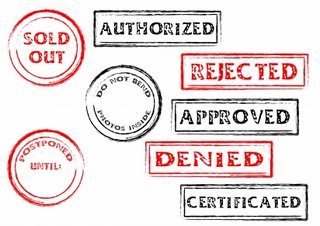Archive for December, 2008
Sunday, December 28th, 2008
Your credit rating is one of your most valuable assets – and when you “lend it out” you’re taking a chance on losing it for a good long time.
Right now lenders are leery of taking on new accounts – one report said that only 15% of home loans are being approved in this new, “fearful” marketplace. That means that some people who would have been considered an excellent credit risk just a year or so ago are now being denied credit.
It’s frustrating and maddening, so of course you want to help when someone you care about is being treated in this manner. But think twice before you jump in.
When you have outstanding credit and someone you love or respect can’t manage to get a mortgage – or even a credit card – there are ways to help, but co-signing for them could turn out to be a disaster.
Consider this real life scenario: A gentleman helped his friend get a credit card – but the friend instead got 2 credit cards from the same bank. And after a while he defaulted on both.
Because the paperwork all went to the friend’s address, the “helper” had no idea that payments were behind until after the credit card company had gone to court and gotten a judgment against both of them! The amount due: $10,000.
The friend, of course, has disappeared – leaving him with the debt.
Of course your family members wouldn’t do this, but they might be too embarrassed to tell you if they get behind on payments – and let it go long enough to destroy your credit as well as their own.
Another gentleman co-signed a business loan at a bank several years ago, knowing that all would be well. It was, and the loan was repaid. Then later the business wasn’t doing well so the owners went back to the same bank to get a second loan. This time the co-signer declined to step in, because he saw some business practices he felt would lead to failure.
Little did he know that when he signed the first loan, it gave the bank the right to keep him as additional security for the second loan. He ended up holding the bag for a $50,000 unpaid note.
So if you’ve ever co-signed a bank note for someone, this is something you should look into. Also, credit card accounts can go on forever, so think about college roommates, romantic partners, and past business associates. Check your credit report and make sure none of their accounts are still showing on your report.
If you really feel compelled to give financial help, you can go about it in a safer manner.
You can take out a loan yourself and lend the money to your friend or relative – letting them make payments to you that you use to pay the loan. Or, you can make sure that all the statements and receipts are coming to your address, so that you can monitor the progress of repayment.
It sounds hard-nosed, but in today’s economy, the slightest blip on your credit report could prevent you from doing the things you want to do.
Marte Cliffe
CreditScoreQuick.com
Posted in co-signing on loans | Comments Off
Saturday, December 27th, 2008

The rule of thumb has been that you should keep your credit card debt ratio down to 30% of your available credit in order to maintain the highest credit scores. Now that 65% of all lenders have tightened up their requirements, credit experts are recommending a limit of 10%.
This credit crunch is expected to get even tighter, as reported in the July Senior Loan Officer Opinion Survey on Bank Lending Practices.
Maintaining a 10% ceiling will become harder to do, as many credit card issuers are lowering credit limits “just because” they want to. Few people read the fine print in their credit card agreements, but most do contain clauses that let your creditors reduce your limits and raise your interest any time they choose to do so.
Since part of your FICO score depends upon the ratio of debt to available credit, when card issuers reduce your credit limit, your scores will drop. In addition, when they increase your interest rates, paying down your balance becomes more difficult.
Work on it now, while your interest rate is still low, and your limit still high. If you wait, your credit score could become the next victim of their arbitrary decisions.
In spite of our government urging us to spend in order to “stimulate the economy,” it’s time now to cut back on spending and increase repayment. And many Americans have done just that.
When the Economic Stimulus Checks were mailed this year people were expected to rush out and buy things. In fact, people on assistance programs were required to either “spend it or lose it.” But surveys showed that only 14% of all Americans did that. The rest of us either paid bills or put it into savings – showing that we do have some good sense.
Still, most families and individuals can find ways to cut back a bit more and pay down those credit cards.
The recently lowered gasoline prices should help a great deal! After many months of double and triple gas costs, we’ve gotten used to the expense. Anyone who did a lot of driving should take that “extra” money and apply it to credit card debt.
You may not feel concerned about this, because you have no need for credit at the moment. But should you suddenly need to borrow money for an emergency, need to relocate to a home in a new community, or want a new car, you’ll realize how important your credit score is to your financial options.
Lenders are demanding higher FICO scores, charging premiums to grant loans, and generally making it tougher for average citizens to get the money they need – when they need it.
Your defense is to beef up your Credit Score to the highest possible level. The first step is to get a copy of your credit report so you know how you stand. The second is to get that credit card debt paid down as quickly as possible.
CreditScoreQuick.com
Posted in credit card limits | 2 Comments »
Saturday, December 27th, 2008
 The Fed, making changes to present policy, hopes to stem the current credit crisis and get the economy rolling via the TALF – the Term Asset-Backed Securities Loan Facility. The Fed, making changes to present policy, hopes to stem the current credit crisis and get the economy rolling via the TALF – the Term Asset-Backed Securities Loan Facility.
Beginning in February, $200 Billion will be made available as loans to holders of AAA-rated asset-backed securities which are backed by loans originated after October 2007. These loans are to include education, car and credit card loans, and borrowing guaranteed by the Small Business Administration. Car leases and auto dealer floor plan loans will be eligible.
Talks are underway to later expand the program to include commercial mortgages, non-agency residential mortgages, or “other asset classes.”
These loans, originally slated to be issued on one-year terms, will now carry 3 year terms. This is good news for the program, as it eliminates a large portion of risk for the investor. 3-years is basically the entire life span of most eligible collateral. Operating under a 1-year term, investors would have had to worry that at the end of 1-year, new financing might not be available. But by the end of 3-years, the asset will be all but gone.
This program is in addition to the separate plan to buy $600 billion of debt issued or guaranteed by federal housing agencies.
Both programs fall under the central bank’s December 16 pledge to “employ all available tools” to restore economic growth.
What does it mean for consumers? It may mean that buying a new car, borrowing money for education, or obtaining a Small Business Loan will be easier, but this doesn’t guarantee that lenders will relax their requirements.
Consumers should still concentrate on lowering their debt ratios and raising credit scores.
The wisest thing consumers can do during this credit crisis is get a copy of their own credit report – with scores – and learn exactly where they stand. Then take all necessary steps to bring those scores as high as they can go.
Increased spending may be the Fed’s answer to reviving a stalled economy, but a reduction in spending is still the smartest move for individual Americans – especially when increased spending translates to increased debt.
Now is the time to analyze your credit report and have any and all errors removed, be always on the lookout for signs of identity theft, and do all you can to reduce your debt load. It’s also a good time to open a savings account, because owning one will help raise your scores.
CreditScoreQuick.com
Posted in Federal Money | Comments Off
Tuesday, December 23rd, 2008
 Buyers of pre-paid credit cards in the form of retailer’s gift cards are under attack this holiday season! These cards have been the ultimate in convenience for friends and family members who want to give a gift but can’t decide exactly what would please. But buying them this year could be risky. Your intended gift of a shopping spree could be nothing but a huge disappointment. Buyers of pre-paid credit cards in the form of retailer’s gift cards are under attack this holiday season! These cards have been the ultimate in convenience for friends and family members who want to give a gift but can’t decide exactly what would please. But buying them this year could be risky. Your intended gift of a shopping spree could be nothing but a huge disappointment.
The threat comes from two directions: First – thieves. Second – the danger of issuing stores going out of business before the cards can be redeemed.
Ever imaginative, thieves have devised several ways to part you from your cash. Some are selling cards on line that have no funds loaded into them at all. Beware of buying from any but an established retailer whom you trust. And even then, go on line to assure yourself that the card is loaded before giving it as a gift.
Other thieves are using cell phones to photograph the numbers on unsold cards hanging in store displays. Then they monitor those card numbers on line until they are purchased and loaded. Once loaded, they spend them on line long before the gift recipient ever sees them. Since these pre-paid credit cards are sold for cash, with no paperwork, authorities have no way to track legal ownership.
In some cases, the theft occurs before the card buyer leaves the store. Swift-fingered employees in some stores have devised a slight-of-hand trick to sell the card, load it with the proper amount, and then switch the card with an empty one before handing it to the buyer.
The customer goes home smiling and happily gift wraps a worthless card while the store employee spends the money.
In addition to this threat is the fact that some stores that will soon be out of business are still selling gift cards. Before you choose a store and buy a card, do a search on line. See if the store is solvent or if you can expect it to close immediately after the Christmas rush.
A couple of ways do exist to protect yourself when buying these pre-paid credit cards in stores. First, choose cards that are encased in plastic wrap with the numbers on the back hidden from prying eyes. Avoid the racks of individual cards. If that’s impossible, pull them off the rack and choose a card from the back, or ask the store clerk if there are cards that have not yet been on display.
Next, keep your eyes on the card while the clerk is loading it. Most of us tend to be distracted, making it easy for a crook to pull a switch. Next, while you still have your receipt, walk to the service desk and have the amount checked. Barring that, check it on line when you get home.
Thieves don’t care that this is the Christmas season, so protect yourself.
CreditScoreQuick.com
Posted in Uncategorized | 1 Comment »
Saturday, December 20th, 2008
I found out that I had a judgment on my report by pulling one. The courts did not notify me or the Marshall. I am the one who found out. I immediately called the court and was given a number to call the Marshall. I did call the Marshall and we worked out an agreement. I have been paying since them. How can I get the judgment removed from my file? Also my credit reports that the amount owed is now 596 and the law office is indicating 906. Neither the Marshall or the lawyer can explain two different amounts and indicates that it is court fees.
Hi Andrea,
A judgment does not come off your credit report for 7 years from file date. So once you have paid the judgment it will be on your credit report for seven years. Now if the court will give you a letter to delete from all three credit bureaus, then you can send that letter to the bureaus to get all information removed.Whom ever is reporting the information would have the reason for the increased owed amount on your credit report.
Good Luck
CreditScoreQuick.com
Posted in Uncategorized | 1 Comment »
Thursday, December 18th, 2008
 Did you know you can refinance your house without the lender even looking at your credit scores or your credit report? This type of refinance is called a streamline refinance. Most lenders will only look at your mortgage payment history; typically your mortgage history has to be in good standing. So you could actually have bad credit and refinance your house. Did you know you can refinance your house without the lender even looking at your credit scores or your credit report? This type of refinance is called a streamline refinance. Most lenders will only look at your mortgage payment history; typically your mortgage history has to be in good standing. So you could actually have bad credit and refinance your house.
With interest rates being upper 4ish range now, it might make sense for you to refinance your current mortgage loan. Typically you don’t want to refinance your home unless you can get the interest rate down 1.5%. You must also plan on staying in the home for about 10 years or longer. The reason for this is the cost of refinancing takes about 10 years to recover.
You also want to make sure you refinance your home as early in the year as possible. The earlier you refinance your house; fewer taxes will need to be rolled into your current note. Taxes are due at the end of the year, so if you also refinance late December usually your current mortgage company has paid your taxes by then. Just make sure before you proceed in late December it has been done by the current lien holder.
With the current rates you could possibly save around $100 to $150 dollars a month with your mortgage payment. These types of savings could help you save more during not so good economic times. You never know what could come up during a recession.
If you are uncertain if you have some late mortgage payments you might check your free credit report before you call a lender. You definitely don’t want to be blind when approaching a lender to refinance your home.
CreditGuruCreditScoreQuick.com
Posted in Uncategorized | Comments Off
Thursday, December 18th, 2008
Q:
Hi, I have a two properties that are in a upside down state and I’m considering short selling them. They are investment properties. My question is after reading your article is that as long payments are still being made during the time it takes to sell my credit score will not be affected?
Thanks for your response in advance.
A:
Hello, thanks for the question about short sales. This is a common problem across the U.S. Short sales do have there advantages if you can get someone to buy your property fairly quickly .Typically during a short sale process you will have to show the bank your hardship.
Also you will be told not to pay your mortgage payment, if you don’t pay it yes it will affect your credit score, if you do pay the mortgage your credit score should not be affected. Make sure you don’t charge up your credit cards, or have any other late payments on your credit report.
CreditGuru
CreditScoreQuick.com
Posted in Uncategorized | Comments Off
Tuesday, December 16th, 2008
Q:
Hi, my name is Sheila. I have a few questions. My Fiancee is in prison and he wants to help him out with his credit. He knows it’s bad and he wants me to help him to get it taken care of, the only problem is I have no idea how to go about doing that. If someone could help me and qive me some advice that would be great.
Sheila
A:
Hi Sheila,
This is probably the most unique question we have had so far about establishing credit. But I have to admit, its a good one. Probably the best way to establish credit for your husband is to get a couple of secured credit cards in your name and ad your husband on the credit cards. If he does not have credit in this current market it will be impossible for him to be added to any un-secured credit card. Secured credit cards require a deposit into a account to secure the credit card in your name.
CreditGuru
CreditScoreQuick.com
Posted in establish credit | Comments Off
Wednesday, December 10th, 2008

When buying a house don’t assume everything is done until your home has closed and funded. Maybe your loan has got an approval from the underwriter, or documents have been sent to the title company to close. Regardless of where you are at with the closing of your new home there are some definite PRECAUTIONS one must take when buying a home. During my career as a lender I have had all sorts of stuff happen because the borrower did not listen to what I said. Here are some things you don’t do before your loan funds.
Avoid the following before closing and funding on your new home loan.
• Co-signing on any loan
• Charging furniture or anything for your new home on your credit cards
• Opening new credit lines with credit card companies.
• Being late on any obligation
• Quitting your job
There is nothing more humiliating than being at the closing table and finding out after all the work and the cost associated with buying a home you are now denied. When buying a home in today’s market most lenders will re-pull your credit at the last moment to make sure nothing has changed.
With this being said make sure you don’t do any of what has been mentioned. Also if you credit score drops for some reason this is a reason for the lender to increase your interest rate on you. You don’t want to go to closing and have any surprises.
With the current strict guidelines on mortgage loans you want to make sure you don’t drop your credit scores. The credit score bar has been raised. Most lenders on a 30 year fixed conventional loan want your middle fico score to be a minimum of a 680 fico score. At one point in time this credit score was great, but not anymore. With this type of score you will pay a higher interest rate. This type of credit score is now considered higher risk to lenders based on past performing loans.
What type of credit scores are lenders looking for? Currently to get the best rates and terms you need to have at least a 720 or above credit score. So if you are not sure you might consider getting a copy of your credit report today.
Posted in Uncategorized | Comments Off
Wednesday, December 10th, 2008
Hi Credit Guru,
Q:
My question is: My General Contractor did not pay sub-contractors who worked on my new house. Consequently, one of them is placing a lien on my house. Will the lien on my house affect my credit?
A:
This is a good question. No a lien against your house will not affect your credit report and credit scores. This mechanics lien that is being put against your house will affect your ability to sell or refinance though. In otherwords it will affect the title of your home.
Here is a list of what will affect your credit report.
- Late payments to creditors
- Public Records, like judgements, bankruptcies, tax liens, etc…..
- Over charging on your credit cards
- Collections
- Too many inquiries on your credit report
- Identity Theft
CreditScoreQuick.com
Posted in Uncategorized | Comments Off
Disclaimer: This information has been compiled and provided by CreditScoreQuick.com as an informational service to the public. While our goal is to provide information that will help consumers to manage their credit and debt, this information should not be considered legal advice. Such advice must be specific to the various circumstances of each person's situation, and the general information provided on these pages should not be used as a substitute for the advice of competent legal counsel.

|








